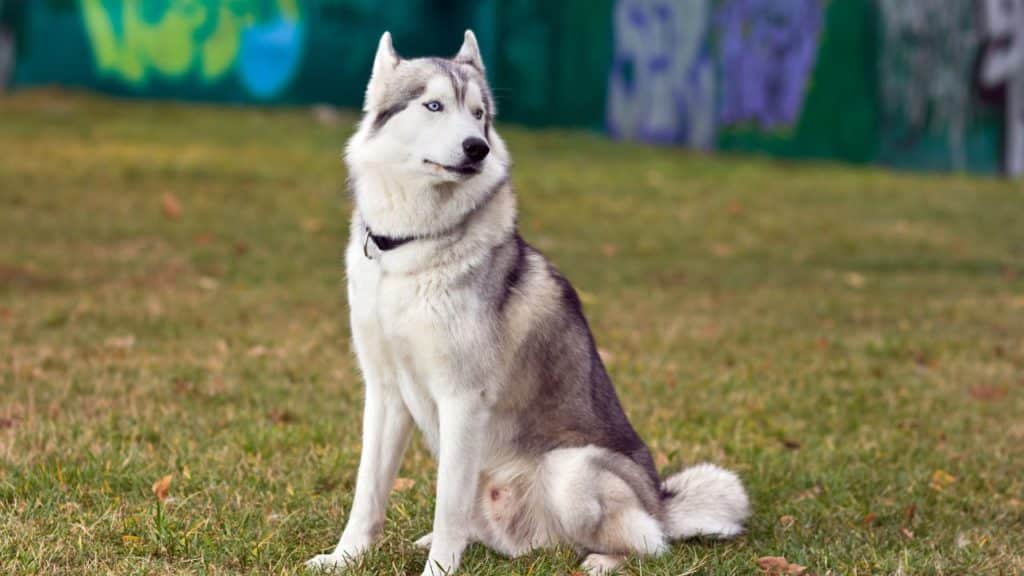
Huskies are known for their loud, high-pitched howls. These vocalizations can be heard from miles away, and it’s not uncommon for them to bark throughout the night.
Why are huskies so vocal? Let’s find out!
The answer lies in the breed’s genetic makeup. Huskies were bred to travel long distances with people on foot or by sled, which means they needed to communicate with their human companions over great distances.
They also need to be able to work independently without constant supervision, so selective breeding favored animals that had a lot of energy and tended towards independence and those that could easily send messages about danger using noises like howling or barking.
Different Sounds – Different Meanings
The message a husky sends with its vocalizations is often very easy to interpret. However, because huskies were bred to work as pack dogs, barking generally means you need to pay attention.
It’s usually a warning about danger or an urgent plea for help from one of your huskies that got hurt or lost. If they’re quiet, then you know everything is OK. But, there might be a problem if they’re howling, and you need to go check it out.
“Talking” – Why do Huskies vocalize?
Huskies also vocalize to communicate with other dogs. They are very social animals, and they use sounds to express emotions, indicate their position in the pack, or get attention from other dogs.
They will often talk – sometimes they bark and howl for apparently no reason – to let other dogs know they’re there. If you’ve ever heard a husky talk, then you know what I mean.
Huskies have a propensity to “confide” in their owners. Every Husky owner has seen their Husky lock eyes with them and begins chatting away. This is a typical type of interaction, and it does not necessarily imply that your dog wants or needs anything from you – he loves and adores you!
Almost all huskies are like this. One possible explanation is that they were bred to live in large groups, which increased their tendency to communicate with the other dogs.
It’s impossible to prevent your Husky from speaking with you. Accept it as a show of affection and applaud it! Many dogs’ owners establish a custom of “answering” them, too.
Howling
Howls are higher in pitch than barks and vary considerably in length (anywhere between 10 seconds and upwards of 20 minutes). A long howl often means your husky is calling for help or is trying to find his way back home.
If you hear your dog howling, try to establish what is causing him distress. For example, he may be lonely and hungry; he might have heard something in the distance that’s worrying him, or he may be trying to alert you to any danger.
Some huskies are more talkative than others and like to vocalize often. If you’re having trouble with incessant howling, try ensuring your dog has plenty of physical exercise or distractions during the day.
Excitement Barking
If your husky is barking for seemingly no reason, he’s probably excited about something.
Huskies are active dogs that tend to have a lot of energy. So when they become excited or start getting impatient, they begin to vocalize and whine as a way of releasing their pent-up energy.
You may also see them performing little “moves” and barking excitedly. If this happens, get your dog outside for a walk, or arrange an exercise session.
Here are the Reasons Behind the Excessive Vocality of Huskies
- Separation Anxiety
- Sensitive Hearing
- Big Personality
Separation Anxiety
Huskies are very social dogs that love human interaction. However, they were bred to live with other huskies and humans, so they can feel anxious when left alone for long periods.
Because they’re bred to work as sled dogs, loneliness is unbearable for them (or at least it feels like unbearable suffering). Letting your husky socialize with his kind is an excellent way to reduce this type of vocalization.
Sensitive Hearing
Huskies have quite sensitive ears that pick up sounds that humans may not even notice. But, unfortunately, they can also hear noises that are far in the distance, so when they get scared or anxious, you will often see them barking at something (or nothing) in the other room.
Big Personality
Huskies are very “chatty” dogs that like to bark, whine and howl to get your attention. If you give them lots of affection and attention for this behavior, then it’ll only become more frequent over time.
Some huskies even seem to bark out of sheer excitement because they’re so intelligent and energetic.
If you give your husky plenty of exercise, attention, toys, or other distractions during the day, then he probably won’t have much energy left over for excessive vocality.
So try to understand that “huskies are chatty” is not an excuse – the main reason they get to bark a lot is that they get bored and lonely sometimes.
Why do Huskies make so much noise?
This is a common problem with Huskies and other breeds bred to live in large packs. They love attention, and they use barking as the way to get more of it!
Their barks are also pretty high-pitched, which means they sound much worse than your average deep bark from a German Shepherd or something else with a massive build. Huskies can even bark continuously for hours, and it gets annoying after a while.
How to Deal With Vocal Huskies?
The best way is to try and reduce the reasons for excessive barking. But, of course, some of these are out of your control (for example, their heightened sense of hearing).
You can try to provide lots of playtimes, exercise, and attention during the day if they tend to bark a lot when left alone or due to boredom.
Huskies are intelligent and active dogs that need plenty of mental stimulation. If you give them lots to do throughout the day, then they’ll have less time or energy to get into mischief or bark excessively at nothing.
So try to understand – Huskies are chatty because they’re bored! And if you want a quiet husky, keep him busy!
Why do Huskies groan?
This is pretty common amongst young dogs and those that are not fully mature. A dog’s “groan” is a way for them to communicate with the pack, and it’s usually related to mating or territorial issues.
You’ll also often hear huskies (and other dogs) barking and howling for this same reason.
A Four-legged Best Friend
Your husky is barking all alone in the backyard or the crate; this is one of the major reasons for excessive vocality. If you keep him with another dog, then surely he will be quiet.
An alone husky male or female may create a challenging situation, and your neighbors keep complaining about excessive vocals. But when you bring another one and make a pair of them, they will surely stay quiet.
House training your dog is also a competent solution; we recommend training your husky on your own to get better results instead of getting professional help.
